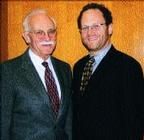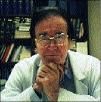Article
Would you want your kids to follow in your footsteps?
The decision whether to become a doctor like Mom or Dad can be a soul-searching experience for both generations.
Would you want your kids to follow in your footsteps?
The decision whether to become a doctor like Mom or Dadcan be a soul-searching experience for both generations.
By Neil Chesanow, Senior Editor

Even though pathologist Robert V. P. Hutter (left) wasn't out to builda dynasty, two out of his three children became doctors. Shown is his son,Andrew M. Hutter, an orthopedic surgeon.
Michael T. Rapp's father, a surgeon, used to pull no punches about hishopes for his son. "He told me point blank that medicine was the bestprofession there could possibly be," Rapp recalls. "He encouragedme by giving me information, showing me what he did, and taking me to theoffice and on hospital rounds. When I was older, he took me into the OR,where I'd even hold retractors while he performed surgery."
But Rapp, now 54, an emergency medicine specialist in Arlington, VA,and president of the American College of Emergency Physicians, took a differenttack with his three kids. "I didn't try to influence them in any way,"he insists. "Even with managed care, medicine is a career that I'dwholeheartedly recommend to young peoplebut only if they want to do it.They should go into it for their own reasons. There's a lot they'd haveto give up."
Nevertheless, Rapp's oldest son, David, is a third-year student at GeorgeWashington University School of Medicine and Health Sciences in Washington,DC, and his youngest son, Matthew, a college senior, is premed at DickinsonCollege in Carlisle, PA, majoring in biochemistry.
Robert V. P. Hutter, 70, a pathologist in Livingston, NJ, and editorof the journal Cancer, didn't prod his three kids to follow in hisfootsteps, either. "I didn't think this was a dynasty to be created,"he reflects. "My wife and I encouraged them to look into other areas."
Be that as it may, Hutter's son, Andrew, became an orthopedic surgeon,and his older daughter, Randi, who earned her MD at Yale University, isa freelance journalist who contributes articles on health and medicine toThe Washington Post and The New York Times.
"I wasn't pushed by my family at all," attests Randi HutterEpstein, now 37. "My father's big thing was: Do what excites youwhateverthat may be."
But Andrew M. Hutter, now 42, interpreted his dad's neutrality differently.Robert recalls: "When Andrew was admitted to medical school, he said,'Well, I guess you're happy. I know you always wanted me to go to medicalschool.' "
Robert was astonished. "Your mother and I encouraged you to lookinto other careers before you made up your mind," he replied.
To which his son retorted: "I always figured you were using reversepsychology."
Encouraging children to be what they want
In putting together this article, we interviewed more than two dozendoctor-parents and their childrenthose who became physicians and thosewho didn't. Many of the interviewees are on staff at St. Barnabas MedicalCenter in Livingston, NJ, where at least 30 physicians are the parents orchildren of doctors. Virtually all the physicians we spoke with said thatthey encouraged, are encouraging, or will encourage their children to exploreall their career options before making a choice. Just as with the Hutterfamily, however, different family members may have different perspectives.
Take Roseland, NJ, infectious disease specialist Leon G. Smith, 69, whohas five kids, four of whom became physicians. As Smith remembers it, "Iencouraged only my first son to become a doctor."
But Steven Smith, 36, the third child and an infectious disease specialistwho works for his father at St. Michael's Medical Center in Newark, NJ,remembers it differently. He recalls his dad routinely going around thedinner table, asking, "So what do you want to do after medical school?"And his sister, Anne Smith Denehy, 34, a radiologist in Brookside, NJ, recallsher father "presenting medical cases to us in terms that a 5-year-oldcould understand, and trying to get us to figure things out by giving usjust enough knowledge to work out the answers."
Looking back, the Smith kids insist that their father's love of medicineand his empathy for patients influenced them far more than any dinnertimerituals. Nevertheless, when a parent is a proud physician, the pressureto carry on the family tradition can be intense.
Consider Shefali I. Shah, 27, a second-year ENT resident at the Universityof Illinois at Chicago. "I briefly considered going into law,"she recalls. "That was one of many career options my parents wantedme to entertain." Her mother, Saroj, is an ob/gyn, her father, Indravadan,a surgeon. "My parents' fear was that since my whole family consistsof doctors, I'd become a doctor, too, just because that's what everyoneelse did, whether I really wanted to or not," she says. Her parentshad the same fears for her brother, Shetal. However, that didn't stop himfrom choosing medicine, either. Now 25, he's a fourth-year student at CornellUniversity's medical school in New York.
Michele M. Blackwood, 38, a general surgeon in Stamford, CT, and thesecond of Leon Smith's children, found herself in a similar quandary whenshe was growing up. She agrees with her siblings that neither of her parentstried to push her into medicine. But with her father a doctor, her mothera nurse, and her older brother already in medical school, Blackwood wastorn.
"My family is very close-knit," she explains. "I couldn'tbe sure if I was trying to please them or myself. I've known people whowent into medicine to please their parents. It can make for a lot of unhappiness."
After graduating from college, Blackwood spent a year working on theNew York Mercantile Exchange and as a retail buyer for a group of gift andclothing shops in South Carolina. That gave her the distance she neededto decide her future.
"That year, for the first time, I was away from my family,"Blackwood re-calls. "I realized that there had to be more to life thanjust making money. Since I had to make a living anyway, I decided to doit by helping people. I wanted my life to be worth something."
Some doctor-parents fear that if they don't push their children to goto medical school, the kids will flounder. If our interviewees are any judges,nothing could be further from the truth. When kids are permitted to seektheir own destinies without parental pressure, it's remarkable how manyseem to choose medicine in the end, however circuitous their paths may be.
Vernon E. Wendt, 68, a cardiologist in Grand Rapids, MI, knows this well.His seven children were free to choose their own careers without badgeringfrom their father. His oldest son chose medicine, but dropped out aftera year of medical school. "He asked the dean to save his seat, drovea truck for a year, and then decided to go back, because being a doctorwas what he really wanted to do," Wendt recalls. The former truck driveris now a cardiologist, just like Dad. Two other children went into medicine,as well. One's a geriatrician, and the other's a radiologist.
Sometimes a parent's hands-off approach stems from ambivalence aboutthe profession. William J. Semel, 62, a pediatrician in Livingston, NJ,didn't push his two daughters to become doctors, even though Semel's sisterand her husband, his uncle and his uncle's two kids, and his wife's brotherare all physicians.
When Semel's oldest daughter, now 35, announced that she not only wantedto go to medical school but to become a pediatrician like her father, Semelhad mixed feelings. "I felt proud, but I was a little worried, too,"he admits. "I knew what lay ahead for her. When a woman tries to mixmedicine with having a family, sometimes it just doesn't work."
The children of surgeon Floyd Smith provide one of the most dramaticillustrations of kids who follow in their doctor-parent's footsteps withoutany pressure from the parent. One winter in the woods of central Washington,Smith was hunting in the snow after dark, fell off a cliff, and was killed.He was 38. He left behind a wife and four children, who ranged in age from3 to 12. While their mother encouraged them to excel academically and instilledin them a love of reading, she didn't push them toward medicine. Yet that'swhere all four ended up: Two sons became internists, one became an FP, anda daughter became a certified nurse midwife.
"In my late teens and early 20s, I was uncertain about what I wantedto do," recalls Terry A. Smith, 40, an internist in Superior, MT, andthe second of the Smith children. "I didn't want anyone pushing me.And no one did. My mother felt that whatever I wanted to do with my lifewas fine. She just wanted me to be happy. She didn't suggest, recommend,or encourage me to go into medicine. I appreciated that. So I'm going togive my four kids a little space and let them decide for themselves whatthey want to do."
When his younger brother, Larry, now 37 and an internist in East Wenatchee,WA, completed his medical training, he initially encouraged his daughters,now 11 and 7, not to follow in his footsteps. "Medical schooland residency take such a huge chunk of time," he observes. "Andkids grow up so fast. You end up missing a lot."
Since then, however, Smith has had a change of heart. "I've decidednot to discourage or encourage my kids," he says now. "Let themchoose for themselves what they want to do. I probably won't say any moreabout it, because I really enjoy medicine now. It was just getting therethat set me back a bitand then finding out that with managed care, mylife as a doctor wasn't going to be what I'd thought."
Warning: You'll hate managed care
Well, what about managed care? Almost every doctor complains aboutit, and many think it has destroyed the joy of medicine. "It's demoralizingto doctors," concedes infectious disease specialist Leon Smith. Eventhough four of Smith's five children became physicians, he maintains that"the smart people go to Wall Street now."
Indeed, his youngest child, Marshall Smith, now 30, considered medicalschool, but ended up becoming an attorney and investment banker, instead.Still, in his case, the apple didn't fall far from the tree: Marshall specializesin biotechnology. "He probably knows more about medicine than mostdoctors," boasts his dad.
Marshall's oldest brother, Leon G. Smith Jr., 40, an ob/gyn in Livingston,NJ, is the father of three girls. "If they were contemplating medicine,I'd tell them it's still a very noble career," he says. "And anMD is still a great degree. My father always said, 'Everyone should havethe luxury of learning about the human body.' It's empowering. But I'd alsowarn my kids that corporate medicine is a trap and may not be what theywant in a career. The profession is changing. Today, it's more a job thana calling or a lifetime commitment."
For the most part, even the younger doctors we interviewed didn't realizein medical school how managed care would change medicine. It was too new.But when they entered private practice, most received a rude awakening.So when we asked these doctors if, with the wisdom of hindsight, they wouldmake the same career choices again, their responses were mixed.
"I'd do it again in a second," declares James A. Rommer, 47,an internist in Livingston, NJ, who shares offices with his internist father.But pediatrician Debra S. Goldenring, 35, who practices in the same town,would try her hand at architecture if she were starting out today. Orthopedicsurgeon Andrew Hutter, 42, of Springfield, NJ, would go into business. SurgeonMichele Blackwood would be a writer.
It's sadeven troublingto hear dedicated physicians voice a desireto have been something else. It's also sobering to hear discontent voicedby doctors who wouldn't choose another occupation if they had thechance. Consider Steven D. Atwood, 44, an internist in Springfield, MO.Atwood's father Dale, a retired FP, was beloved by the 3,000 people of Kinsley,KS, whom he cared for throughout his long career.
"As kids, we saw how everyone depended on Dad," Atwood recalls."He was always doing good things, and people spoke of him in good terms.It just seemed to us that he was the man. We all had that image ofhim as the role model whom everyone would aspire to emulate."
And emulate him all five of his sons did. Three of Steven Atwood's brothersLarry,Mike, and Jeffbecame FPs. Another, Eric, is a child psychiatrist. Earlierin his career, when Steven practiced in Oklahoma, the Oklahoma Society ofInternal Medicine voted him the outstanding young internist in the state,and later, when he relocated to Missouri, the Missouri Society of InternalMedicine bestowed on him its Distinguished Internist of the Year award.He was also honored with a fellowship in the American College of Physicians.
Despite all this, however, Atwood is glad that his only child, now acollege freshman majoring in design, chose not to follow in his footsteps.Had she wanted to, he would have tried to dissuade her. "Medicine haschanged," he says. "It's become too business-orientedtoo muchof a numbers game. It's really fun to care for patients and feel needed.But making medicine a business diminishes doctors' enthusiasm for the job.It also diminishes our service. My dad enjoyed his practice enormously.But much of the time, I don't enjoy mine, because of the politics and hasslesthat come with managed care."
Blackwood heard the same complaints when she was choosing a career. "WhenI went into medicine, I knew about managed care, although I didn't realizethe extent of it," she recalls. "Every doctor I met said, 'Don'tgo into medicine. You'd be crazy to.' And I was very concerned about it.But I remembered something my father once said to me: 'There will alwaysbe room for a good doctor.' So I told myself, I'm just going to hold onto that thought and plunge ahead."
Plunge ahead they continue to domanaged care woes, government regulatoryhassles, and malpractice threats notwithstanding. The inspiration is oftentheir physician-parents, who serve as such strong role models that the kidsyearn to be just like them.
Second-year ENT resident Shefali Shah, who already feels hamstrung bymanaged care restrictions, is a case in point. "Growing up with twoparents who are doctors, and seeing how much joy they derived from theirwork, I eventually came to realize that in no other profession could I reapso much happiness, because of the positive impact I could have on otherpeople's lives," she says. "This, truly, is the right career forme." *
It's not what you say; it's who you are

Of Roy T. Rapp's six children, only one followed in his footsteps. Buttwo grandchildren are headed for careers in medicine .
Roy T. Rapp, 72, (above) a surgeon and FP in Quincy, IL, makes no bonesabout it: He tried to influence all six of his children to become doctors."I feel like I've never worked a day in my life," he declares."So, yes, I tried to influence them, and I've been trying to influencemy grandchildren, too."
Rapp set a formidable example for his kids. "My earliest memoriesare of when he was a doctor for a coal company in eastern Kentucky in theearly 1950s," recalls his oldest son, Michael, an emergency physicianin McClean, VA. "He provided all the medical care for an impoverishedcommunity of 500. He was licensed as a surgeon, but he did everything. He'dgo into the mine to care for the miners when they were injured. He deliveredI don't know how many babies.
"One time, when I was older, Dad got a call about someone with abdominalpain, and we went to the emergency department to check him out. He showedme how hard the abdomen was. He took me into the operating room, and I watchedas he opened the man's abdomen. The patient had a perforated ulcer. He showedme how to sew that up. He also set broken bones and performed gynecologicalsurgery. All that made a lasting impression. He's a very broadly skilledphysician, probably more so than any doctor I've ever met."
When his turn came to be a father, Michael Rapp neither encouraged nordiscouraged his kids to follow in his footsteps. He believes the sacrificesare too great for the decision to be unduly influenced by a parent. ButRapp's oldest son, David, a third-year medical student, needed no encouragementto be like his father. "On one of my medical school applications, Iincluded photos of myself at age 3," he recalls. "In one, I havea Fisher-Price stethoscope around my neck, and I'm listening to my teddybear's heartbeat. In another, I have a PDR on my lap. In my opening statement,I wrote, 'I tell people that I've wanted to be a doctor ever since I canremember. Here's the proof.' "
Michael Rapp served as a role model for his son early on. "WhenI was in kindergarten, we had Career Day," David remembers. "Dadput casts on everyone in the class. He also brought syringes without theneedles. They were filled with orange soda, and he squirted some into eachof my classmates' mouths."
Roy Rapp had a hand in inspiring his grandson, as well. "As kids,my cousin and I would visit my grandfather's clinic and play around,"David says. "He had one of the nurses show us the urine centrifuge.He said, 'Watch this.' He put some urine in the machine and spun it. Thatwas really cool."
As his father had done with him, Michael Rapp took David with him intothe ER when the boy was growing up. That's not all. "Early in college,I was fortunate to get a job as an emergency medical technician, so I wasable to work with my father for a period of years," David says. Andin 1998, in preparation for David's third year of medical school, "Igot to work side by side with my dad as a medical student, where he wasactually teaching me. That was really nice."
If this sounds like Michael Rapp wasn't exactly neutral in influencinghis son's career choice, David sets the record straight. "My dad encouragedme as much as I wanted to be encouraged," he explains. "But hewas adamant about its being my own decision. He made me well aware of whatI was getting into when it became clear that being a doctor was what I wasgoing to do. It was a good thing, too, because it's one tough road."
Neil Chesanow. Would you want your kids to follow in your footsteps?.
Medical Economics
2000;1:98.





